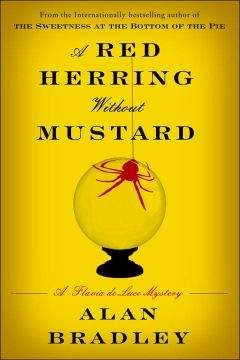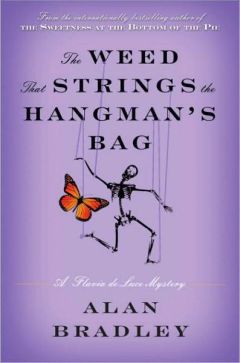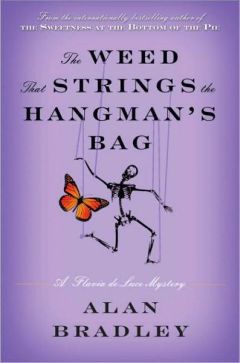Alan Bradley - A Red Herring Without Mustard: A Flavia de Luce Novel

Скачивание начинается... Если скачивание не началось автоматически, пожалуйста нажмите на эту ссылку.
Жалоба
Напишите нам, и мы в срочном порядке примем меры.
Описание книги "A Red Herring Without Mustard: A Flavia de Luce Novel"
Описание и краткое содержание "A Red Herring Without Mustard: A Flavia de Luce Novel" читать бесплатно онлайн.
Surprised, the sergeant broke off gazing at Feely and leapt to his feet.
“Just a moment, Sergeant,” she said. “I’ll show you the way.”
The traitor! The minx! Even with her little sister under attack, Ophelia could think of nothing but courtship.
“Wait,” I said. “The laboratory is locked. I’ll have to go fetch the key.”
Before anyone could think to stop me, I had swept past Feely and the sergeant, out the door, and was halfway down the hall.
The truth was that the key was in my pocket, but without turning me upside down and shaking me, they had no way of knowing that.
Up the stairs I dashed, taking them two at a time, as if all the demons of Hades were at my heels. Into the east wing I fled, and down the long corridor.
I fumbled at the lock of the laboratory, but something inside the mechanism seemed to be mucked up, as if—
I gave a fierce shove and the door flew open, propelling me almost into the arms of … Porcelain!
TWENTY-SIX
“WHAT ARE YOU DOING here?” I hissed, my heart still pounding like a trip-hammer. “I thought you were in London.”
“I might have been,” Porcelain said, “but something made me come back to apologize.”
“You did that once before,” I said, “and you botched it. I can live without another of your so-called apologies.”
“I know,” she said, “and I’m sorry. I didn’t tell you the truth about Fenella. She wasn’t conscious when I went to the hospital. And she didn’t tell me you’d attacked her. I made all of it up because I wanted to hurt you.”
“But why?”
“I don’t know. I wish I did, but I don’t.”
Suddenly she was in tears, sobbing as if her heart would break. Without thinking, I went to her, put my arms around her, and pulled her head against my shoulder.
“It’s all right,” I said, even though it wasn’t.
But something inside me had undergone a sudden shift, as if my interior furniture had been rearranged unexpectedly, and I knew, with a strange new calmness, that we would sort things out later.
“Wait here until I come back,” I said. “Father’s expecting me downstairs, and I mustn’t keep him waiting.”
Which was true, as far as it went.
As I walked back into the drawing room, Sergeant Graves was still standing quite close to Feely, a look of disappointment on his face.
“I put it in this,” I explained, handing Inspector Hewitt a square cardboard box, “so that there would be the least number of points in contact with the glass surface.”
I did not explain that, because it was precisely the right size, I had pinched the box from Feely’s bedroom, nor did I mention that I had flushed a pound of Yardley’s lavender bath salts down the toilet for want of a better place to put it on short notice.
The Inspector lifted the top flap gingerly and glanced inside.
“You’ll find a ring of faint smudges on the glass,” I said. “Most likely whatever’s left of the fingerprints—”
“Thank you, Flavia,” he said in a flat voice, handing the box to Sergeant Graves.
“… and perhaps a few of mine,” I added.
“Take this straightaway to Sergeant Woolmer, in Hinley,” the Inspector said, ignoring my small joke. “Come back for me later.”
“Yes, sir,” Sergeant Graves said. “Hinley it is.”
“Hold on a minute,” I said. “There’s more.”
I carefully pulled one of Feely’s embroidered handkerchiefs from my pocket.
“This,” I said, “might well be a copy of the silver lobster pick that killed Brookie Harewood. Or perhaps it’s the original. It’s got the de Luce monogram on it. One of the Bull children was digging with it in the Gully. If there are any fingerprints on it besides his and mine, you’ll quite likely find that they match the ones on the crystal ball.”
I looked round the room to watch the reactions on everyone’s faces as I handed the thing over to Inspector Hewitt.
As Mrs. Mullet once said, you could have heard a pin droop.
“Good lord!” Father said, stepping forward and reaching for the thing even as the Inspector was still unwrapping it.
I had almost blurted out that the rest of the family silver was on its way to Sotheby’s, but something made me hold my tongue. What a bitter blow to Father it would have been had I let that slip out.
“Please, Colonel, don’t touch it,” the Inspector said. “I’m afraid this must now be treated as evidence.”
Father stood staring at the silver lobster pick as if he were a snake that had come unexpectedly face-to-face with a mongoose.
Daffy sat bolt upright on the divan, glaring at me with what I took to be hatred in her eyes—as if she held me responsible for all of Father’s misfortunes.
Feely’s hand was at her mouth.
All of these details were frozen on the instant, as if a photographer’s flash had gone off and preserved forever a thin and uncomfortable slice of time. The silence in the room was audible.
“Killed Brookie Harewood?” Inspector Hewitt said at last, turning to me. “This lobster pick? Please explain what you mean by that.”
“It was in his nose,” I said, “when I found his body hanging from the Poseidon fountain. Surely you saw it?”
Now it was the Inspector’s turn to stare in disbelief at the object in his hand.
“You’re quite sure?” he asked.
“Positive,” I said, a little peeved that he should doubt me.
I could see that the Inspector was choosing his words carefully before he spoke.
“We found no lobster pick at the scene of the crime—and none has turned up subsequently.”
No lobster pick at the scene of the crime? What a ludicrous statement! It was like denying the sun in the sky! The thing had been there, plain as day, stuck up Brookie’s nostril like a dart in a corkboard.
If the pick had fallen out through force of gravity, for instance, the police would have found it in the fountain. The fact that they hadn’t could mean only one thing: that someone had removed it. And that someone, most likely, was Brookie’s killer.
Between the time Porcelain and I had walked away from the fountain, and the time that the police arrived—no more than, say, twenty minutes—the killer had crept back, scaled the fountain, and removed the weapon from Brookie’s nose. But why?
The Inspector was still staring at me intently. I could see his cogs turning.
“Surely you don’t think I killed Brookie Harewood?” I gasped.
“As a matter of fact, I don’t,” Inspector Hewitt said, “but something tells me that you know who did.”
I didn’t move a muscle, but inwardly I positively preened!
Fancy that! I thought. Recognition at last!
I could have hugged the man, but I didn’t. He’d have been mortified, and so—but only later, of course—would I.
“I have my suspicions,” I said, fighting to keep my voice from sliding into an upper register.
“Ah,” the Inspector said, “then you must share them with us sometime. Well, thank you all. It has been most illuminating.”
He summoned Sergeant Graves with his eyebrows, and went to the door.
“Oh, and Colonel,” he said, turning back. “You will keep Flavia at home?”
Father did not reply, and for that, I decided on the spot, his name would be inscribed forever in my private book of saints and martyrs.
And then, with a rustle of officialdom, the police were gone.
“Do you think he likes me?” Feely asked, making a beeline for the looking glass on the chimneypiece.
“I should say so,” Daffy replied. “He was all green eyes, like the monster cuttlefish in Twenty Thousand Leagues Under the Sea.”
With no more than a look of perplexity, Father left the room.
Within minutes, I knew, he would be submerged in his stamp collection, alone with whatever squids and cuttlefish inhabited the depths of his mind.
At that moment I remembered Porcelain.
It didn’t come easily to me to knock at the door of my own laboratory, but knock I did. No point in startling Porcelain and ending up with my throat slit from ear to ear.
But when I stepped inside, the laboratory was empty, and I felt my anger rising. Blast her! Hadn’t I told her to stay where she was until I returned?
But when I opened my bedroom door, there she was, sitting cross-legged on my bed like a malnourished Buddha, reading my notebook.
It was too much.
“What do you think you’re doing?” I shouted, running across the room and snatching the book from her hand.
“Reading about myself,” she said.
I’ll admit it: I saw red.
No, that’s not quite true: I first saw white—a silent, brilliant white that erased everything—like the A-bombs that had been dropped on Hiroshima and Nagasaki. Only after this deadly burst of flower petals had begun to cool and fade, passing first from yellow through orange, did it at last simmer down to red.
I had been angry before, but this was like something ripped from the pages of the Book of Revelation. Could it be some secret fault in the de Luce makeup that was manifesting itself in me for the first time?
Until now, my fury had always been like those jolly Caribbean carnivals we had seen in the cinema travelogues—a noisy explosion of color and heat that wilted steadily as the day went on. But now it had suddenly become an icy coldness: a frigid wasteland in which I stood unapproachable. And it was in that instant, I think, that I began to understand my father.
This much was clear: I needed to get away—to be alone—until the tidal wave had passed.
“Excuse me,” I said abruptly, surprising even myself, and walked out of the room.
I sat for a while on the stairs—neither up nor down.
It was true that Porcelain had violated my privacy, but my response had frightened me. In fact, I was still shaking a little.
I riffled idly through the pages of my notebook, not really focusing upon its written entries.
What had Porcelain been reading when I interrupted her? She had been reading about herself, or so she claimed.
I could hardly remember what I had written. I quickly found the spot.
PORCELAIN—Can’t possibly be her grandmother’s attacker since she was in London at the time. Or was she? I have only her word for it. But why did she feel compelled to wash out her clothing?
The answer to that remained a puzzle, but surely, if Porcelain had come back to do me in, she’d have done so by now.
As I closed the book, I remembered that at the time my last notes were made, I had not yet met the Pettibones. I had promised the Queen Bee that I would bring her some papers from Buckshaw relating to Nicodemus Flitch and the Hobblers.
The fact that I had fabricated these juicy documents on the spur of the moment was really of no importance: with a library like Buckshaw’s, there might very well be documents lurking that would satisfy the woman’s obvious greed.
If the library was unoccupied, I could begin my search at once.
I was feeling better already.
I listened with my ear glued to the door. If Daffy was inside reading, as she usually was, I could swallow a teaspoon of pride and ask her opinion, perhaps under cover of an insult, which almost always resulted in her taking the bait.
If that didn’t work, there was always the Solemn Truce. Under these rules, I would, immediately upon entering the room, drop to one knee on the carpet and declare “Pax vobiscum,” and if Daffy replied, “Et cum spiritu tuo,” the ceasefire went into effect for a period of five minutes by the mantel clock, during which time neither of us was allowed to offer any incivility to the other.
If, on the other hand, she flung an inkwell, then the peace pipe was declined, and the whole thing was off.
But there was no sound from the other side of the panel. I opened the door and peeked round it.
The library was empty.
I stepped inside and closed the door behind me. For safety’s sake, I turned the key in the lock and, although it probably hadn’t been operated in the past hundred years, the bolt slid home in perfect silence.
Good old Dogger, I thought. He had a way of seeing that essentials were taken care of.
If anyone questioned me, I would claim that I was feeling somewhat peaked, and had hoped to have a nap without being disturbed.
I turned and had a good look round the library. It was simply ages since I’d been alone in this room.
The bookshelves towered towards the ceiling in strata, as if they had been formed geologically in stacks, by the upwards shifting of the earth.
Near the floor and closest to hand were the books that belonged to the present generation of de Luces. Above these, and just out of reach, were those that had been hoarded by the house’s Victorian inhabitants, above which, piled to the ceiling, was the rubbish left behind by the Georgians: hundreds and hundreds of leather- and calf-bound volumes with thin worm-eaten pages and type so small it made your eyes go buggy.
I’d had a squint once before at some of these relics, but had found them devoted mainly to the lives and sermons of a bunch of dry old sticks who had lived and died while Mozart was still crawling around in diapers.
If ever there was a graveyard of religious biography, this was it.
I’d work methodically, I thought, one wall at a time, top of the north wall first, then top of the east wall, and so forth.
Books about dissenting clergymen were not exactly kept at one’s fingertips at Buckshaw. Besides, I wasn’t sure exactly what I was searching for, but I knew that I would likely find it nearer the ceiling.
I dragged the rolling library ladder into position and began my climb: up, up, up—my footing more precarious with every step.
Libraries of this design, I thought, ought to be equipped with oxygen bottles above a certain height, in case of altitude sickness.
Which made me think of Harriet, and a sudden sadness came over me. Harriet had scaled these very same bookcases once upon a time. In fact, it was stumbling upon one of her chemistry texts in this very room that had changed my life.
“Get on with it, Flave,” said a strict-sounding voice inside me. “Harriet is dead, and you’ve got work to do.”
Up I went, my head still cocked at an uncomfortable angle from reading titles on book spines at the lower levels. Fortunately, at this higher altitude, the older volumes had sensible, no-nonsense horizontal titles stamped deeply into their spines in gold-leaf letters, making them three-dimensional, and relatively easy to read in the perpetual twilight near the ceiling:
The Life of Simeon Hoxey; Notes on the Septuagint; Prayer and Penance; Pew’s Thoughts Upon Godliness; Astronomical Principles of Religion Natural and Reveal’d; The Life and Opinions of Tristram Shandy, Gentleman; Polycarp of Smyrna; and so forth.
Just above these was Hydraulicks and Hydrostaticks, a relic, no doubt, of Lucius “Leaking” de Luce. I pulled the book from the shelf and opened it. Sure enough, there was Lucius’s bookplate: the de Luce family crest, with his name written beneath it in a surprisingly childish hand. Had he owned the book when he was a boy?
Подписывайтесь на наши страницы в социальных сетях.
Будьте в курсе последних книжных новинок, комментируйте, обсуждайте. Мы ждём Вас!
Похожие книги на "A Red Herring Without Mustard: A Flavia de Luce Novel"
Книги похожие на "A Red Herring Without Mustard: A Flavia de Luce Novel" читать онлайн или скачать бесплатно полные версии.
Мы рекомендуем Вам зарегистрироваться либо войти на сайт под своим именем.
Отзывы о "Alan Bradley - A Red Herring Without Mustard: A Flavia de Luce Novel"
Отзывы читателей о книге "A Red Herring Without Mustard: A Flavia de Luce Novel", комментарии и мнения людей о произведении.






